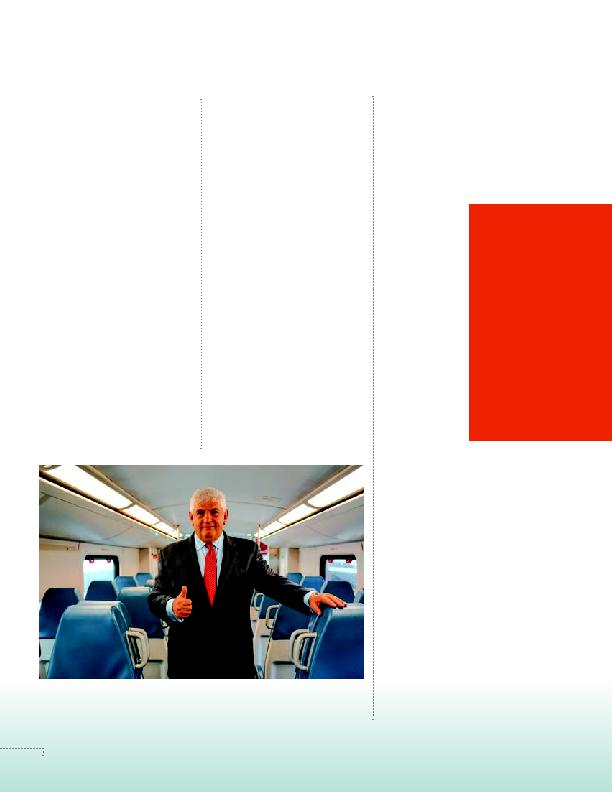
TRAVEL MORE THAN
400 MILLION MILES
EACH YEAR (8 BILLION
SINCE INCEPTION),
THE SECOND-
BUSIEST PUBLIC
TRANSPORTATION
PROVIDER IN
SOUTHERN
CALIFORNIA.
changing Southern California," says
Charlene Ariza, a Metrolink marketing
manager who was there at the
beginning. She's passionate about
helping to untangle the traffic knot in
Southern California, a commitment
shared by Metrolink CEO Art Leahy
and his staff and the 11-member
Metrolink board chaired by San
Jacinto Councilman Andrew Kotyuk.
transportation commissions of Los
Angeles, Orange, Riverside, San
Bernardino and Ventura counties that
came together in the early 1990s to
give their travel-weary constituents an
option to buck freeway traffic.
Metrolink train rolled out of the
Moorpark Station bound for Los
Angeles Union Station at 5:06 a.m.
on Oct. 26, 1992, it marked the
return of regional passenger rail
of the Pacific Electric Railway's Big
Red cars quit running in 1961.
century, Metrolink has made the most
significant difference in Southern
California transportation," notes
Hasan Ikhrata, executive director of
the Southern California Association
of Governments (SCAG), himself a
Metrolink rider.
residents of the region, Metrolink
offered the first real alternative to
driving. That accounts for the rapid
growth of Metrolink, which started
with three lines serving two counties
spanning 112 route miles, 11
stations and 2,300 daily boardings.
lines through six Southern California
counties. There are 60 stations
along 538 miles of railroad track.
from Lancaster and Ventura to Los
Angeles, Anaheim, Riverside, San
Bernardino, Perris and Oceanside
are seamlessly connected. Metrolink
trains glide along at up to 90
miles per hour in some corridors,
making them
competitive with
the automobile
sans the stress of
driving as trains
pass congested
freeway traffic.
travel more than
400 million miles
each year (8 billion
since inception),
making Metrolink
the second-
busiest public
transportation
provider in
Southern
California.
Metrolink also
is the third-largest commuter rail
agency in the United States based on
directional route miles and the eighth-
largest based on annual ridership.
experienced decreasing ridership,
perhaps in part due to rideshare apps
like Uber and Lyft which offer more
convenience for some short trips,
Metrolink ridership has remained
steady. Most Metrolink riders
commute long distances.
massive enterprise was launched just
two years after railroad right-of-way
was acquired from Southern Pacific